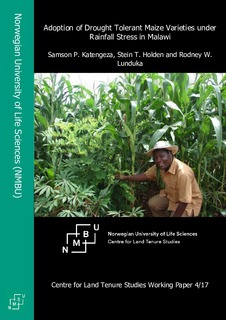Adoption of drought tolerant maize varieties under rainfall stress in Malawi
Working paper
Permanent lenke
http://hdl.handle.net/11250/2481003Utgivelsesdato
2017Metadata
Vis full innførselSamlinger
- CLTS Working papers (HH) [119]
Sammendrag
This paper examines adoption of drought tolerant (DT) maize varieties under rainfall stress in Malawi using a Mundlak-Chamberlain panel Probit model with a Control Function approach. DT maize varieties is a promising technology that has the capacity to help smallholder farmers adapt to drought risks. Using a four-round panel data spanning nine years from six districts, results show an increase in adoption from 2% in 2006 to 41% in 2015. The paper finds a positive impact
of one year and two years lag of longest early dry spells and two years lag of late dry spells on the likelihood of adoption but a negative impact of one year lag of late dry spell. The positive findings imply that farmers learn from previous exposure to drought and respond by adopting weather riskreducing technologies such as DT maize. Furthermore, the impact of lagged early droughts suggests that farmers show a high preference for early maturing DT maize. However, the conflicting results of late dry spells with one year lag reporting negative and two years lag positive suggest that farmers do not immediately respond to late drought shock by adopting DT maize but rather take time to appreciate the significance of the varieties as a technology that survive better under drought during maize flowering phase. These findings could imply that there is still limited awareness among smallholder farmers in Malawi on the benefits of DT maize. There is a need therefore to improve on good extension messages to allow farmers make better-informed decisions.

